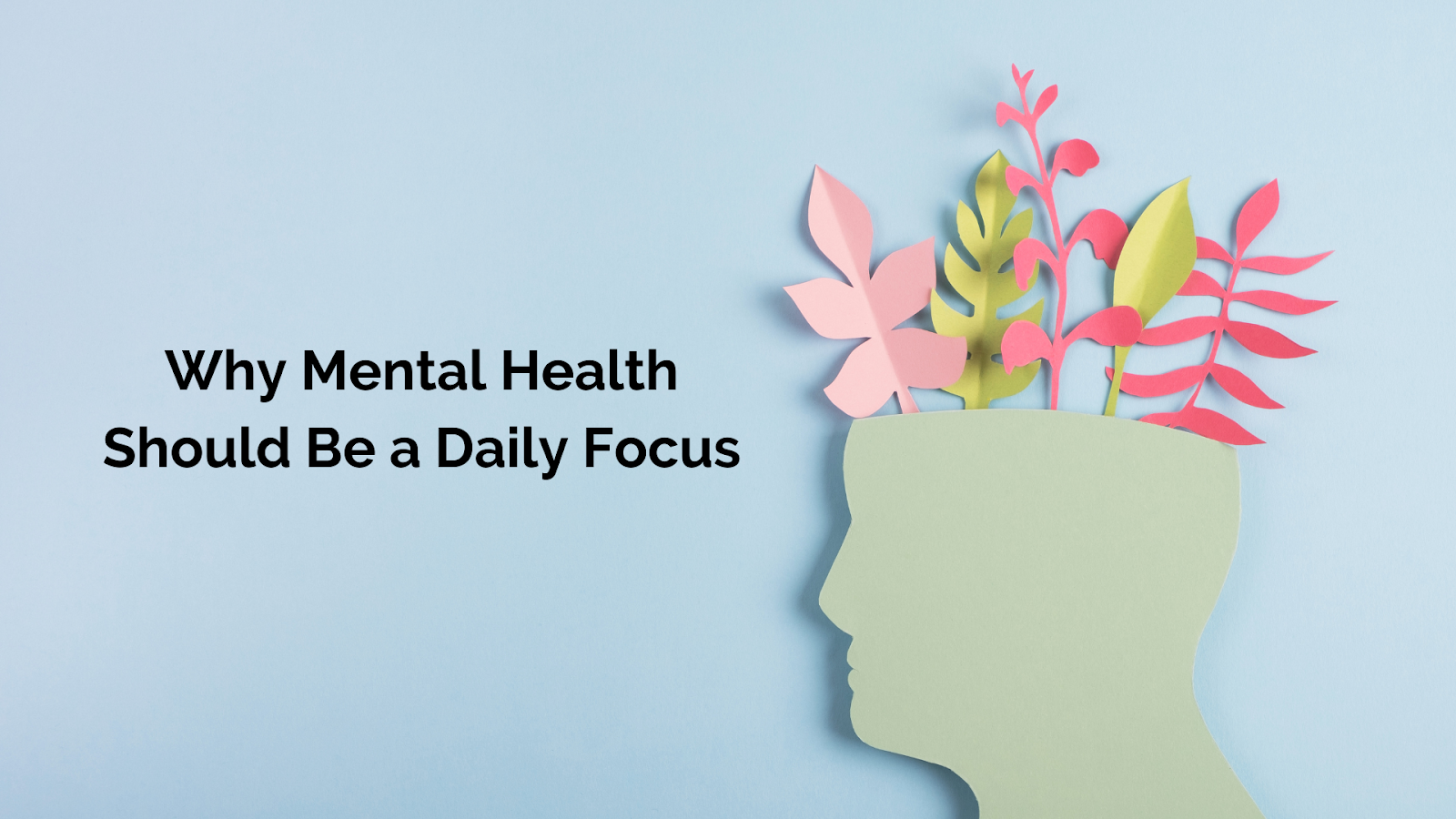In our fast-paced world, we often prioritize physical health, diet, and exercise. However, mental health deserves equal attention. Unlike physical ailments that are often visible, mental health issues can remain hidden beneath the surface, potentially escalating into severe problems if left unaddressed.
Consider your mind as a garden. With daily care – removing weeds and nurturing flowers – it flourishes. Neglect, however, allows weeds to overrun the beauty. This analogy underscores the importance of daily mental health focus.
The Deep Connection Between Mind and Body
The ancient saying, “A healthy mind in a healthy body,” holds profound truth. The connection between mental and physical health is intricate and bidirectional.
How Mental Health Affects Your Body
Poor mental health doesn’t merely impact mood; it can manifest in various physical symptoms:
Headaches: Chronic stress and anxiety often lead to tension headaches or migraines. These aren’t just minor inconveniences but can significantly impact daily life and productivity.
Stomach issues: The gut-brain connection is well-established in medical literature. Anxiety and stress can trigger or exacerbate conditions like irritable bowel syndrome (IBS), acid reflux, and even ulcers.
Heart disease: Long-term stress elevates cortisol levels, which can increase blood pressure and heart rate. Over time, this strain on the cardiovascular system can contribute to heart disease risk.
Weakened immune system: Prolonged mental distress can suppress immune function, making you more susceptible to infections and prolonging recovery times.
Sleep disturbances: Anxiety and depression often disrupt sleep patterns, leading to insomnia or oversleeping. Poor sleep, in turn, can exacerbate mental health issues, creating a vicious cycle.
Chronic pain: Mental health conditions like depression can lower pain thresholds, potentially leading to or intensifying chronic pain conditions.
The Two-Way Street of Health
Just as mental health impacts physical well-being, the reverse is also true. Physical health significantly influences mental state:
- Exercise: Regular physical activity boosts mood by releasing endorphins, the body’s natural “feel-good” chemicals. It also reduces stress hormones like cortisol and adrenaline.
- Nutrition: A balanced diet supports brain function. Omega-3 fatty acids, for instance, are crucial for cognitive health and have been linked to reduced symptoms of depression.
- Sleep: Quality sleep is essential for mental health. During sleep, the brain processes emotions and consolidates memories, contributing to emotional resilience.
- Chronic illness: Managing a chronic physical condition can take a toll on mental health, potentially leading to anxiety or depression.
In New York, the hustle and bustle can add layers of stress and anxiety, making it crucial to address mental health proactively. For those struggling with addiction, which can severely impact mental health, seeking professional help from a reputable rehab in new york can provide the necessary support to navigate these complexities.
By focusing on mental health daily, you’re not just nurturing your mind – you’re supporting your entire body’s well-being. This holistic approach to health recognizes that mental and physical health are deeply intertwined, each influencing and being influenced by the other.
Building Resilience: Your Mental Armor
Life is unpredictable. Career changes, relationship challenges, and unexpected obstacles are part of the human experience. Resilience, often described as mental armor, is the ability to adapt to stress and adversity, bouncing back from difficult experiences.
Daily Mental Health Habits Build Strength
Resilience isn’t an innate trait but a skill that can be developed over time. Like a muscle, the more you work on it, the stronger it becomes. Daily mental health practices are crucial in building this psychological strength:
Mindfulness: This practice involves focusing on the present moment without judgment. Even a few minutes of mindfulness daily can reduce stress, improve emotional regulation, and enhance overall well-being. Techniques can include mindful breathing, body scans, or simply paying attention to your surroundings.
Positive self-talk: The way we speak to ourselves significantly impacts our mental state. Cultivating a habit of positive self-talk can boost confidence and resilience. This doesn’t mean ignoring problems, but rather approaching challenges with a constructive mindset.
Gratitude: Regularly acknowledging things you’re thankful for can shift your perspective towards positivity. This practice has been linked to improved mental health, better sleep, and even stronger immune function.
Goal-setting: Setting and working towards achievable goals can provide a sense of purpose and accomplishment, boosting self-esteem and resilience.
Learning new skills: Engaging in continuous learning keeps the mind active and adaptable, contributing to cognitive resilience.
Healthy Coping vs. Harmful Habits
When faced with stress or adversity, it’s common for people to turn to coping mechanisms. However, not all coping strategies are created equal. Some can be harmful in the long run:
Unhealthy coping mechanisms include:
- Excessive alcohol use: While it might provide temporary relief, alcohol can exacerbate anxiety and depression.
- Overeating or undereating: Using food to cope with emotions can lead to unhealthy relationships with eating and potential health issues.
- Isolating yourself: While alone time can be beneficial, excessive isolation can worsen feelings of loneliness and depression.
- Procrastination: Putting off tasks might provide momentary relief but often leads to increased stress later.
By focusing on mental health daily, you develop healthier ways to cope:
- Talking to friends or family: Social support is crucial for mental well-being.
- Exercising: Physical activity is a powerful stress reliever and mood-booster.
- Practicing relaxation techniques: Methods like deep breathing, progressive muscle relaxation, or guided imagery can help manage stress.
- Engaging in hobbies: Pursuing activities you enjoy can provide a sense of accomplishment and joy.
- Journaling: Writing down thoughts and feelings can help process emotions and gain perspective.
These positive strategies help you navigate stress without compromising your health. They build resilience over time, equipping you to handle future challenges more effectively.
Boosting Productivity and Performance
A healthy mind isn’t just about feeling good – it’s also about performing at your best in various aspects of life, including work, studies, and personal projects.
Mental Health in the Workplace
The impact of mental health on workplace performance is significant:
Focus and concentration: Mental health issues like anxiety or depression can significantly impair concentration. It’s like trying to run through mud – every task becomes more difficult. Good mental health, on the other hand, allows for clearer focus and sustained attention.
Decision-making: Mental clarity is crucial for effective decision-making. When mental health is compromised, it can lead to indecisiveness or impulsive choices. A healthy mind can weigh options more effectively, considering long-term consequences.
Creativity and innovation: Mental well-being fosters an environment where creativity can flourish. When not bogged down by excessive stress or negative thoughts, the mind is free to explore new ideas and innovative solutions.
Interpersonal skills: Good mental health supports better communication and collaboration. It enhances empathy and emotional intelligence, which are crucial for teamwork and leadership.
Resilience to workplace stress: A mentally healthy individual is better equipped to handle workplace pressures, deadlines, and challenges without burning out.
The Economic Impact
Mental health impacts extend beyond individual performance, affecting entire organizations and economies. Poor mental health leads to increased absenteeism and presenteeism, resulting in significant economic losses. Unaddressed mental health issues drive up healthcare costs for individuals and organizations.
Additionally, mental health challenges contribute to job dissatisfaction and higher turnover rates, increasing recruitment and training expenses. Conversely, a mentally healthy workforce fosters organizational innovation and growth, driving economic progress.
Prioritizing mental health creates a ripple effect of benefits, enhancing individual performance, improving organizational outcomes, and contributing to broader economic stability.
Strengthening Relationships and Community
Our mental state profoundly influences how we interact with others and engage with our community. Good mental health is the foundation for building and maintaining strong, meaningful relationships.
Better Communication, Stronger Bonds
When we’re mentally healthy, our interpersonal skills are enhanced, leading to stronger bonds. Good mental health allows us to practice active listening, staying present and attentive in conversations without distraction. It also enables clear expression, helping us articulate thoughts and feelings effectively.
A healthy mind fosters greater empathy, allowing us to understand and share others’ emotions, essential for deep connections. Emotional regulation is improved, reducing the likelihood of lashing out or withdrawing, leading to more stable interactions.
These enhanced communication skills and emotional regulation equip us to navigate and resolve conflicts healthily, enriching relationships with friends, family, romantic partners, and colleagues.
Building a Healthier Community
The benefits of good mental health extend beyond individual relationships to impact entire communities:
Increased civic engagement: Mentally healthy individuals are often more inclined to participate in community activities. This could involve volunteering for local causes, participating in neighborhood clean-ups, or engaging in local politics.
Social cohesion: When community members are mentally healthy, it fosters a sense of belonging and connection. This can lead to stronger social networks and support systems within the community.
Reduced stigma: As more people prioritize mental health and speak openly about it, it helps reduce the stigma surrounding mental health issues in the community.
Economic benefits: Communities with better overall mental health may see reduced healthcare costs and increased productivity, contributing to local economic stability.
Crisis resilience: Communities, where mental health is a priority, are often better equipped to handle crises or natural disasters, as individuals are more resilient and support systems are stronger.
Breaking Down Barriers: Reducing Stigma
Despite significant progress in recent years, mental health stigma remains a substantial barrier to seeking help and promoting overall well-being. By making mental health a daily focus, we can actively work to break down these barriers.
The Power of Open Conversations
When we normalize discussions about mental health, awareness increases as people become educated about various conditions, symptoms, and treatment options. Open dialogue helps challenge and correct myths and misconceptions surrounding mental health, fostering a more accurate understanding. Shared experiences make individuals feel less isolated in their struggles, reducing self-stigma and the shame or embarrassment associated with mental health challenges.
Moreover, improved support systems emerge as friends and family members gain a better understanding of how to support loved ones dealing with mental health issues, enhancing overall community well-being.
Early Intervention: A Game-Changer
Reducing stigma leads to earlier intervention, significantly impacting treatment outcomes. When people feel comfortable seeking help, they’re more likely to address mental health concerns before they escalate, resulting in a better prognosis.
Early treatment can prevent mild symptoms from developing into severe conditions, lowering healthcare costs and improving quality of life. By focusing on mental health daily and speaking openly about it, we foster a culture where seeking help is viewed as a proactive, responsible choice, not a sign of weakness. This shift encourages timely treatment and enhances overall well-being.
Practical Steps: Making Mental Health a Daily Priority
Incorporating mental health practices into your daily routine doesn’t have to be overwhelming. Here are some expanded practical steps to consider:
Start Your Day Mindfully: Begin each day with a mindful approach. Take a few deep breaths upon waking to center yourself, set positive intentions for the day, and engage in a short morning meditation or yoga session to foster calm and focus.
Move Your Body: Aim for at least 30 minutes of moderate exercise daily. Incorporate short walking breaks throughout the day and try different types of physical activity to find what you enjoy, ensuring you stay active and energized.
Connect with Others: Regularly check in with friends and family to maintain social connections. Join clubs or groups aligned with your interests and practice active listening in your interactions to strengthen relationships and feel supported.
Practice Gratitude: Maintain a gratitude journal to reflect on what you’re thankful for. Share your appreciation with others and take a moment to reflect on positive experiences before bed to foster a positive mindset.
Limit Social Media: Set specific times for social media use to avoid overindulgence. Use app blockers if needed and curate your feed to include positive, inspiring content that uplifts rather than overwhelms you.
Get Enough Sleep: Establish a consistent sleep schedule and create a relaxing bedtime routine. Ensure your sleeping environment is comfortable and conducive to rest, promoting better sleep quality.
Eat a Balanced Diet: Incorporate a variety of fruits, vegetables, whole grains, and lean proteins into your diet. Stay hydrated and be mindful of how different foods affect your mood and energy levels.
Try Meditation: If new to meditation, start with guided sessions and gradually increase your meditation time. Explore different types of meditation to find what works best for you.
Seek Professional Help: Regular check-ins with a therapist can be beneficial even if you’re not in crisis. Consider online therapy options if in-person sessions are challenging, and don’t hesitate to try different therapists to find the right fit.
Practice Stress Management Techniques: Learn and practice deep breathing exercises, try progressive muscle relaxation, and use visualization techniques to calm your mind and manage stress effectively.
Engage in Hobbies: Set aside time for activities you enjoy and try new hobbies to stimulate your mind. Use creative outlets as a form of self-expression to enhance your mental well-being.
Set Boundaries: Learn to say no to commitments that overwhelm you, communicate your needs clearly in relationships, and create a work-life balance that supports your well-being.
Remember, the key is consistency. Small steps taken daily can lead to significant improvements in your mental health over time.
Conclusion: Your Daily Mental Health Journey
Making mental health a daily focus isn’t about achieving perfection. It’s about progress and cultivating habits that support your overall well-being. Just as we brush our teeth daily for oral health, we need to tend to our mental health with the same regularity and care.
Remember, every small step counts. The mental health habits you build today are an investment in your future well-being. It’s never too late to start, and you don’t have to make drastic changes all at once. Begin with one or two practices that resonate with you and gradually build from there.




